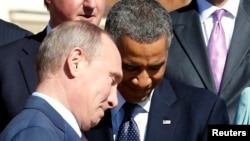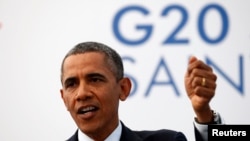U.S. President Barack Obama and Russian President Vladimir Putin are still at odds over a potential strike on Syria, after discussing the issue on the sidelines of the G20 (Group of 20) economic summit in Russia.
At a Friday news conference, Obama said his conversation with Putin was "candid" and "constructive." But he added that he did not believe the talk would change Russia's opposition to any foreign military intervention in Syria.
Obama is trying to win international support for military action to punish Syria's government for an alleged chemical attack that killed more than 1,400 people in August. The U.S. president said he would address the American people about the issue Tuesday night and continue to work with Congress on a resolution authorizing military action.
The president said most world leaders attending a G20 dinner late Thursday were "comfortable" with the U.S. conclusion that the Syrian government was responsible for the attack. He said the leaders were "unanimous" in believing that international norms against the use of chemical weapons had to be maintained.
"Where there is a division has to do with the United Nations. There are a number of countries that just as a matter of principal believe that if military action is to be taken, it needs to go through the U.N. Security Council," said President Obama.
British Prime Minister David Cameron sided with Obama, saying there are times it may be necessary to act without approval from the Security Council.
"If we accept that the only way a response can be made to a country that, let's say, was massacring half or more than half its people, if we're saying there can only be a response if the U.N. Security Council votes positively, we are, in fact, contracting out our foreign policy, our morality to the potential of a Russian veto. Now I think that is a very misguided approach," said Cameron.
Putin said any foreign strike on Syria would be "illegal." He said the chemical attack was a "provocation" by opposition fighters in Syria who are receiving foreign support.
Putin said leaders from India, Indonesia, South Africa and India were among those who spoke against any military intervention at the summit.
The Russian president said he feared that going into Syria would hurt the global economy by raising the price of energy and stifling global economic development.
“In such a difficult time in general for the world economy, to destabilize the situation in the Middle East is counterproductive. That’s at a minimum, I will say it very diplomatically," said Putin.
China and Russia have voted down Security Council resolutions that would have pressured the government of Syrian President Bashar al-Assad.
In a joint statement issued by the White House Friday, the U.S. and 10 other G20 nations called for a strong international response to Syria's "grave violation" of international rules.
The statement says the Security Council has been "paralyzed" for over two years on Syria and the world can not wait for "endless failed processes."
France, which has been a strong supporter of military action against Syria, signaled hesitancy on Friday. At a G20 news conference, President Francois Hollande said his country would await the outcome of a U.N. chemical weapons team report on Syria before deciding on any action.
Obama returns to Washington Friday, where he is seeking to convince U.S. lawmakers to authorize Syria military action.
U.N. chief Ban Ki-moon warned world leaders at the summit against what he called "ill-considered" military strikes he said could worsen sectarian tensions in Syria.
Ban made his comments at a humanitarian meeting on the sidelines of the G20 summit. Warning against "further militarization of the conflict," Ban said military strikes could have "tragic consequences" and lead to further sectarian violence.
The U.S. State Department has issued travel warnings for neighboring Lebanon and Turkey. The U.S. ordered non-emergency personnel and family members to leave embassies in both countries and has also warned U.S. citizens to avoid travel to the countries.
U.S. Secretary of State John Kerry traveled to Europe Friday, where he will continue the administration's efforts to get international support for possible action against Syria. His trip includes talks with Arab League and European Union officials.
In a Friday opinion piece in the Huffington Post, Kerry said he planned to lay out evidence about the alleged attack and seek to "broaden support" for a limited military strike that would deter the Syrian government from future attacks.
At a Friday news conference, Obama said his conversation with Putin was "candid" and "constructive." But he added that he did not believe the talk would change Russia's opposition to any foreign military intervention in Syria.
Obama is trying to win international support for military action to punish Syria's government for an alleged chemical attack that killed more than 1,400 people in August. The U.S. president said he would address the American people about the issue Tuesday night and continue to work with Congress on a resolution authorizing military action.
The president said most world leaders attending a G20 dinner late Thursday were "comfortable" with the U.S. conclusion that the Syrian government was responsible for the attack. He said the leaders were "unanimous" in believing that international norms against the use of chemical weapons had to be maintained.
"Where there is a division has to do with the United Nations. There are a number of countries that just as a matter of principal believe that if military action is to be taken, it needs to go through the U.N. Security Council," said President Obama.
British Prime Minister David Cameron sided with Obama, saying there are times it may be necessary to act without approval from the Security Council.
"If we accept that the only way a response can be made to a country that, let's say, was massacring half or more than half its people, if we're saying there can only be a response if the U.N. Security Council votes positively, we are, in fact, contracting out our foreign policy, our morality to the potential of a Russian veto. Now I think that is a very misguided approach," said Cameron.
Putin said any foreign strike on Syria would be "illegal." He said the chemical attack was a "provocation" by opposition fighters in Syria who are receiving foreign support.
Putin said leaders from India, Indonesia, South Africa and India were among those who spoke against any military intervention at the summit.
The Russian president said he feared that going into Syria would hurt the global economy by raising the price of energy and stifling global economic development.
“In such a difficult time in general for the world economy, to destabilize the situation in the Middle East is counterproductive. That’s at a minimum, I will say it very diplomatically," said Putin.
China and Russia have voted down Security Council resolutions that would have pressured the government of Syrian President Bashar al-Assad.
In a joint statement issued by the White House Friday, the U.S. and 10 other G20 nations called for a strong international response to Syria's "grave violation" of international rules.
The statement says the Security Council has been "paralyzed" for over two years on Syria and the world can not wait for "endless failed processes."
France, which has been a strong supporter of military action against Syria, signaled hesitancy on Friday. At a G20 news conference, President Francois Hollande said his country would await the outcome of a U.N. chemical weapons team report on Syria before deciding on any action.
Obama returns to Washington Friday, where he is seeking to convince U.S. lawmakers to authorize Syria military action.
U.N. chief Ban Ki-moon warned world leaders at the summit against what he called "ill-considered" military strikes he said could worsen sectarian tensions in Syria.
Ban made his comments at a humanitarian meeting on the sidelines of the G20 summit. Warning against "further militarization of the conflict," Ban said military strikes could have "tragic consequences" and lead to further sectarian violence.
The U.S. State Department has issued travel warnings for neighboring Lebanon and Turkey. The U.S. ordered non-emergency personnel and family members to leave embassies in both countries and has also warned U.S. citizens to avoid travel to the countries.
U.S. Secretary of State John Kerry traveled to Europe Friday, where he will continue the administration's efforts to get international support for possible action against Syria. His trip includes talks with Arab League and European Union officials.
In a Friday opinion piece in the Huffington Post, Kerry said he planned to lay out evidence about the alleged attack and seek to "broaden support" for a limited military strike that would deter the Syrian government from future attacks.






